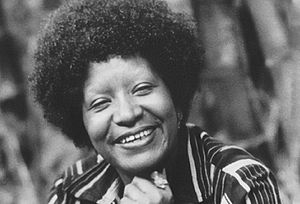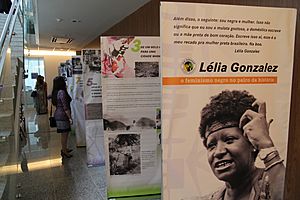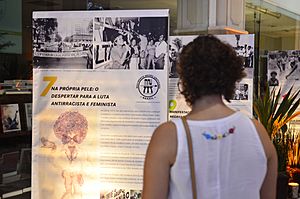Lélia Gonzalez facts for kids
Quick facts for kids
Lélia Gonzalez
|
|
|---|---|

by Cezar Loureiro.
|
|
| Born | February 1, 1935 |
| Died | July 10, 1994 (aged 59) |
| Nationality | Brazilian |
| Occupation | Anthropologist, professor, politician |
Lélia Gonzalez (born February 1, 1935 – died July 10, 1994) was an important Brazilian thinker, politician, and professor. She was also an anthropologist and a strong supporter of human rights, especially for women.
Contents
Her Early Life and Education
Lélia Gonzalez was born in Belo Horizonte, Brazil, on February 1, 1935. Her father worked on the railroad, and her mother was an indigenous maid. Lélia was one of eighteen children. One of her brothers was Jaime de Almeida, a famous football player for Flamengo.
In 1942, when Lélia was seven years old, her family moved to Rio de Janeiro. She studied hard and earned degrees in history and philosophy. After finishing her studies, she became a public school teacher.
Becoming a Professor
Lélia continued her education, getting a master's degree in media and a doctorate in political anthropology. Political anthropology is the study of how power and politics work in different cultures. She started to focus her research on how gender and ethnicity are connected in society.
She taught Brazilian Culture at the Pontifical Catholic University of Rio de Janeiro. She also led the sociology and politics department there.
During the 1960s, Brazil was under a dictatorship (a government where one person or group has total power). Lélia taught at a high school called CAp-UERJ. She used her philosophy classes to talk about resistance and social issues. This helped shape her students' ideas and actions.
Her Work for Change
Lélia Gonzalez was a very active person who wanted to make Brazil a fairer place. She helped start many important groups. These included the Black Movement of Brazil and the Research Institute of Black Cultures (IPCN). She also helped create the Black Women's Collective, N'Zinga, and the group Olodum.
Her work for black women's rights was very important. She served on the National Council on Women's Rights from 1985 to 1989.
Running for Office
Lélia also tried to make a difference through politics. She ran for a federal legislative position with the Workers' Party. She was chosen as the first alternate, meaning she would take the position if the main candidate couldn't. In 1986, she ran again for state representative with the Democratic Labour Party and was again chosen as a substitute.
Her writings often talked about the political dictatorship and the rise of social movements. She always tried to connect the bigger struggles in Brazilian society with the specific needs of black people, especially black women.
In 1982, she published a book called Lugar de Negro with Carlos Hasenbalg. In 1987, she published another book titled Festas populares no Brasil.
How She is Remembered
Lélia Gonzalez is remembered in many ways. A public school in Rio de Janeiro is named after her. There is also a black culture center in Goiânia and a cultural cooperative in Aracaju that carry her name.
The African bloc Ilê Aiyê honored her in two of their Carnival celebrations in Bahia. In 1997, she was part of their story "Black Pearls of Knowledge." In 1998, they honored her with "Candace."
In 2003, a play called Candaces - A reconstrução do fogo ("Candaces: A Reconstruction of Fire") was written and directed by Márcio Meirelles. It was based on Lélia's work.
In 2010, the government of Bahia created the Lélia Gonzalez Award. This award encourages cities in Bahia to create public policies that help women.
On February 1, 2020, Google celebrated her 85th birthday with a special Google Doodle on their homepage.
See also
 In Spanish: Lélia Gonzalez para niños
In Spanish: Lélia Gonzalez para niños
 | Janet Taylor Pickett |
 | Synthia Saint James |
 | Howardena Pindell |
 | Faith Ringgold |



